- Contents
After four days of vote tallying, the Independent National Electoral Commission (INEC) of Nigeria formally declared Bola Tinubu the winner of the country’s highly contested presidential election. The declaration is not without controversy, however, as multiple opposition parties have disputed the legitimacy of the election and promised to challenge the results in court. For his part, president-elect Tinubu has appealed for reconciliation with his rivals and urged all Nigerians to unite behind his administration when he takes office in May.
GeoPoll conducted a survey prior to the election to gauge public sentiment about the state of the country, people’s trust in the electoral process, and their intention to vote. Now that the presidential election is over, GeoPoll implemented a follow-up study to learn about people’s voting experiences on election day, as well as their confidence in the election process and results.
Findings from the post-election survey are detailed in this post. To view the full results, filterable by question, state, gender, and age group, scroll down to the Interactive Data Dashboard.
Voting Experience
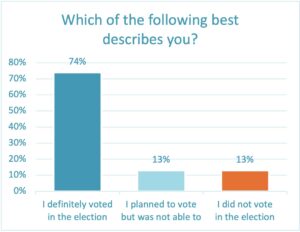 Voter turnout in Nigeria has been on a steady decline since peaking at 69% in 2003. Although 74% of respondents in our study claim to have voted in the 2023 election, only 29% of registered voters in Nigeria actually voted on election day – the lowest participation rate since Nigeria’s independence.
Voter turnout in Nigeria has been on a steady decline since peaking at 69% in 2003. Although 74% of respondents in our study claim to have voted in the 2023 election, only 29% of registered voters in Nigeria actually voted on election day – the lowest participation rate since Nigeria’s independence.
Of the 26% that did not vote, 41% say it was due to “registration/PVC problems.” Another 18% say they had problems at the polling station.
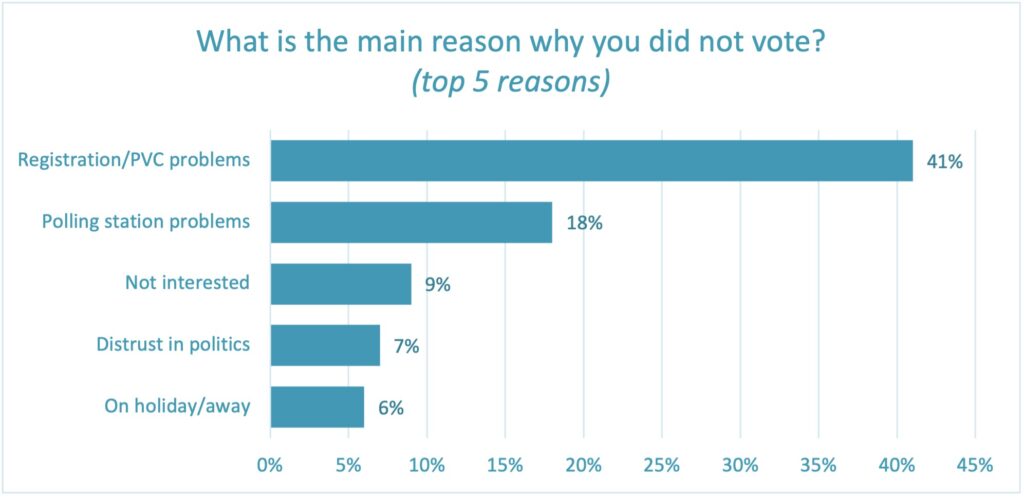
For those that did vote, most had a “good” or “very good” voting experience (61%). Only 19% had a “poor” or “very poor” experience.
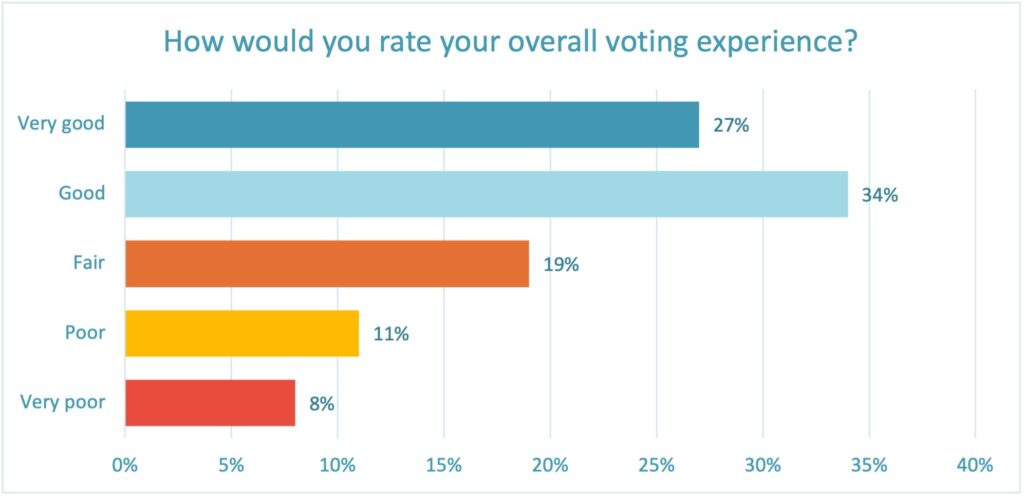
61% of voters report a “good” or “very good” voting experience.
Both the expectation and initial reports of late starts at polling stations may have dissuaded some voters. Delays were blamed on a variety of issues, including technical difficulties, late-arriving officials, cash shortages that affected transport, and attacks on polling stations. Most of the voters in our study report experiencing at least minor delays (61%), with 21% saying their polling station opened more than 2 hours behind schedule.
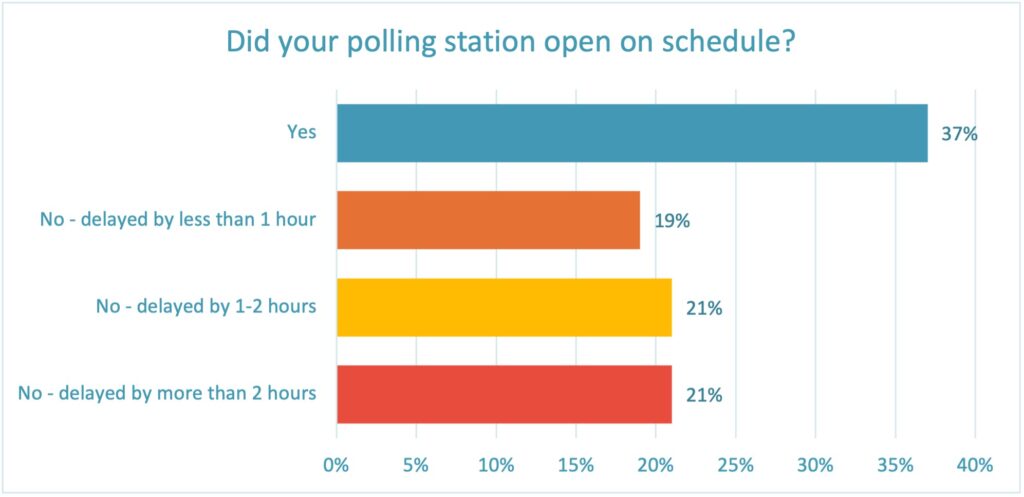
Whether their polling station opened on time or not, most respondents waited in line for at least 1 hour to vote (60%). Almost 1 in 3 (32%) waited for 3 hours or more.
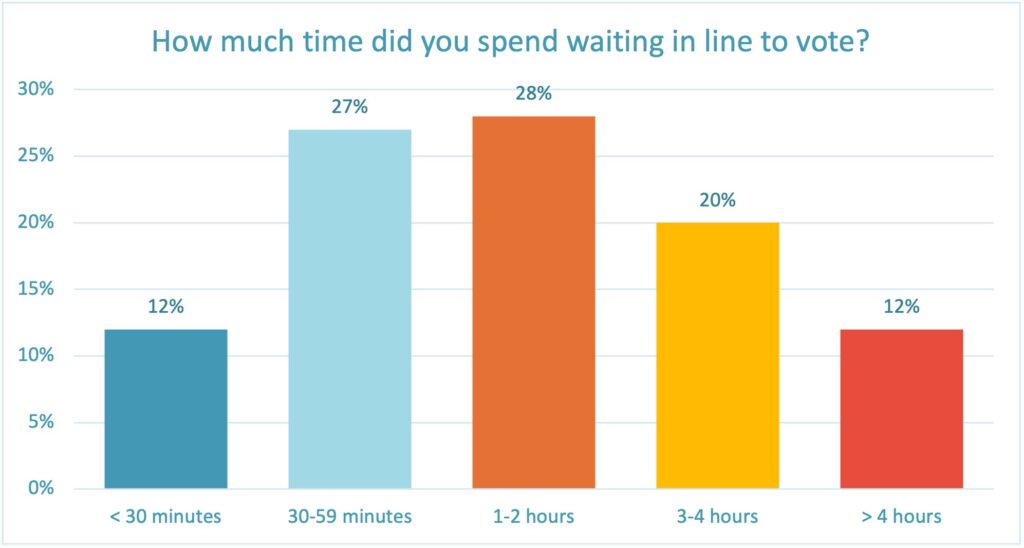
60% waited in line for at least 1 hour to vote.
Despite fears of violence leading up to the elections, voting was largely peaceful outside of a few isolated incidents. Those incidents likely contribute to the 4% of respondents that say they felt “very unsafe” at their polling station. Most, however, report feeling “somewhat safe” or “very safe” (81%). Women report feeling slightly less safe than men.
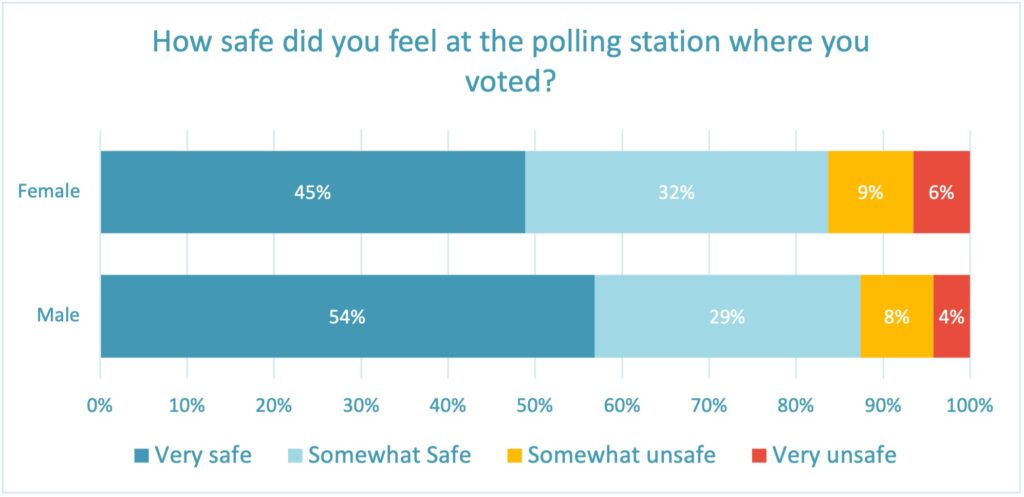
In our study conducted a week before the election, most respondents felt “frustrated” with the current situation in Nigeria. Frustration continues to be the most common sentiment now that the election is over, but the percentage dropped from 58% to 45%. The percentage feeling “scared” also decreased, while those experiencing positive feelings (hopeful, blessed and happy) increased.
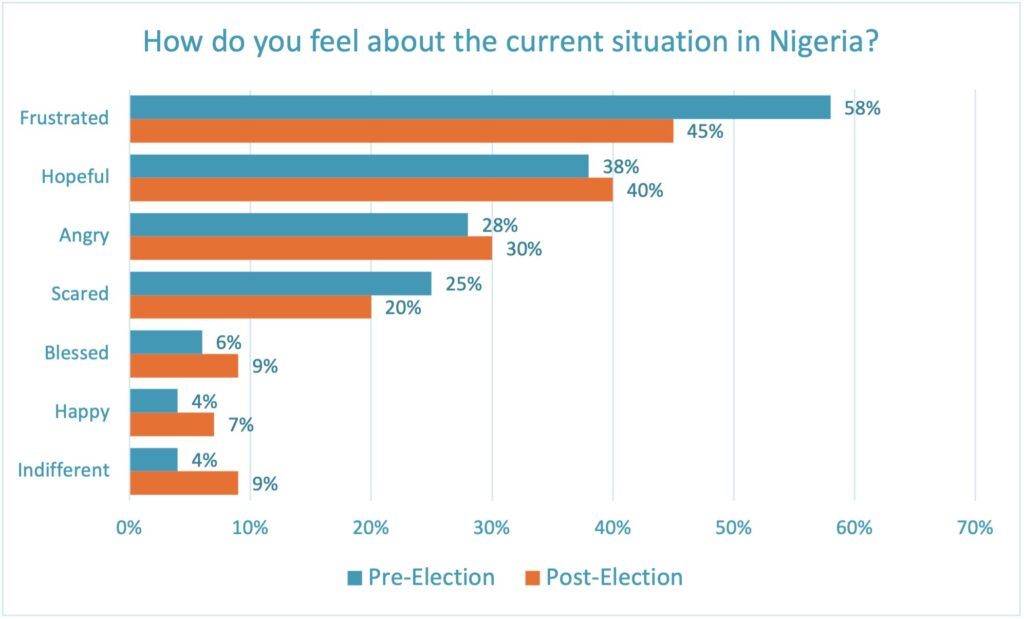
Trust in the Electoral Process Pre- and Post-Elections
The electoral process for the 2023 Nigeria Presidential Election has been plagued by controversy since before the first votes were cast. While acknowledging technical glitches with its vote tallying platform, the Independent National Electoral Commission (INEC) stands by its declaration of Bola Tinubu as the president-elect, and has asked opposition parties to take their grievances to court.
As the parties prepare their legal challenges and the president-elect prepares his administration, we presented voters a series of statements related to their faith in the electoral process, and asked whether they agree or disagree with each statement.
Election Results Acceptance, Fraud, and Violence
Respondents’ expectations for a fraud- and violence-free election that would be accepted by all Nigerians far exceeded their actual experience. The chart below shows the percentages of respondents that “disagreed” or “strongly disagreed” with each of the three statements, both before and after the election.
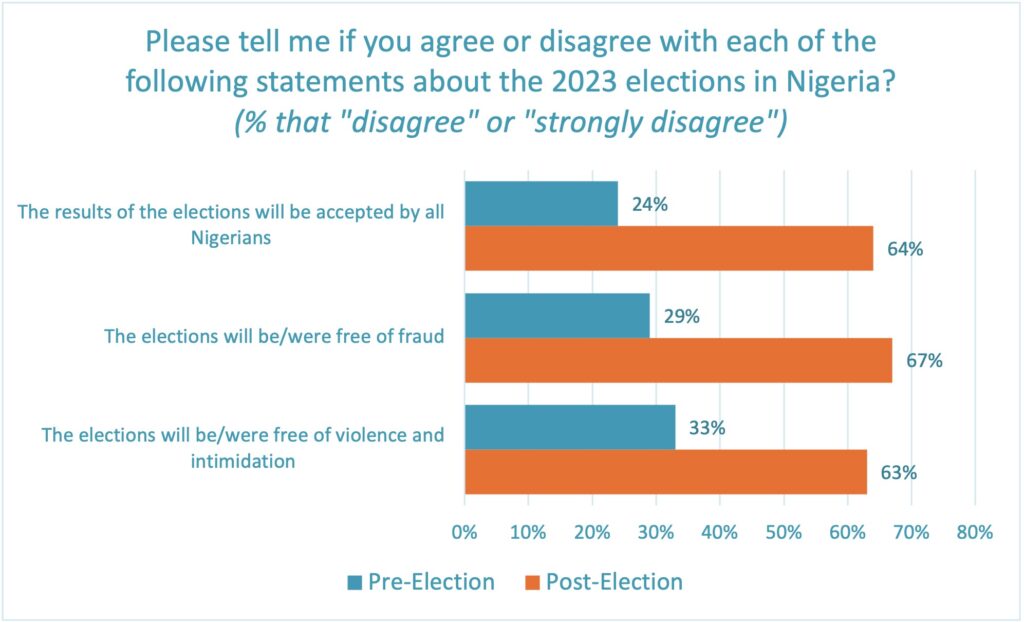
Opposition party-led protests have dampened respondents’ hope that the results of the 2023 general elections will be accepted by all Nigerians. The percentage that “disagree” or “strongly disagree” with that statement climbed from 24% in the pre-election survey to 64% in the post-election survey.
Disputes over the electoral commission’s handling of the vote also increased perceptions of fraud. Those that disagree or strongly disagree that the elections will be/were free of fraud more than doubled pre-/post-election, rising from 29% to 67%.
Although election day has been deemed mostly peaceful, voters expected better. While only 33% disagreed or strongly disagreed that the elections would be free of violence and intimidation before the election, 63% disagree or strongly disagree with that statement now that the election is over.
Perceptions of INEC’s Performance
On election day, delays at polling stations, technical difficulties, and allegations of irregularities raised concerns about INEC’s planning and performance. After the election, glitches in INEC’s results viewing platform and delays in announcing the results appear to have amplified those concerns.
In our study, voters’ express significant dissatisfaction with INEC’s performance.
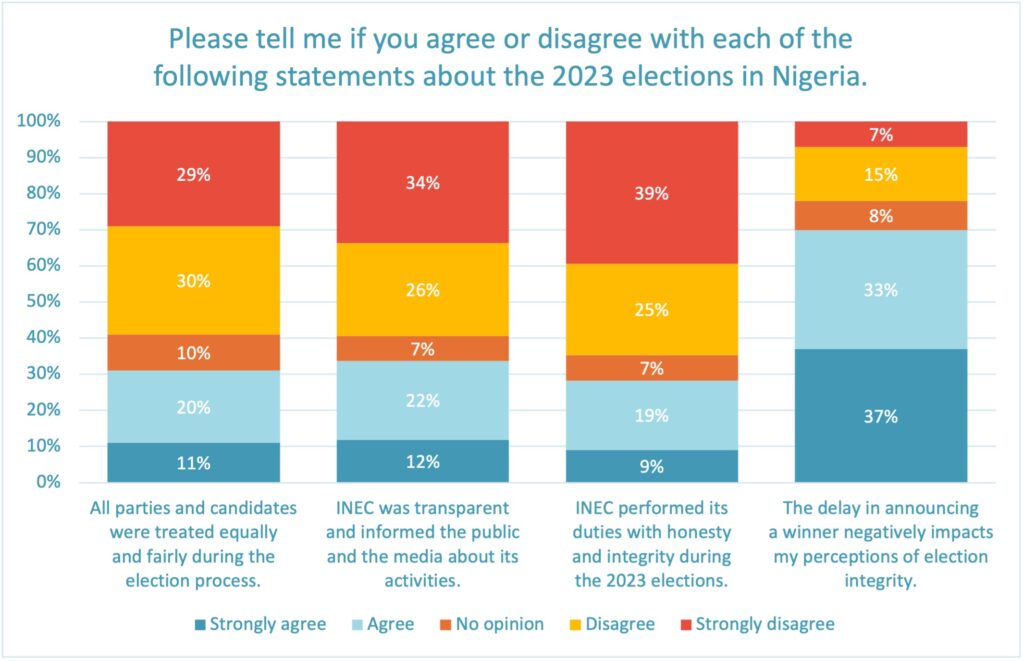
Only 31% of respondents agree or strongly agree that all parties and candidates were treated equally and fairly during the election process. Most appear to support opposition party claims of an overall lack of fairness.
Only 31% agree that all parties and candidates were treated equally and fairly.
In the pre-election survey, almost 2 in 3 respondents (65%) agreed or strongly agreed that INEC is transparent and informs the public and media about its activities. That percentage dropped to 34% after the election. Several independent observers, including the European Union, have criticized the election for lacking transparency.
The largest segment of respondents (39%) strongly disagree that INEC performed its duties with honesty and integrity during the 2023 elections. Only 9% strongly agree.
The delay in announcing a winner appears to have sapped public confidence in a free and fair election. Most agree or strongly agree (70%) that the delay in announcing a winner negatively impacts my perceptions of election integrity.
Most also say they have very little to no confidence (63%) in INEC’s vote tally and declaration of a winner.
63% have very little or no confidence in INEC’s vote tally and declaration of a winner.
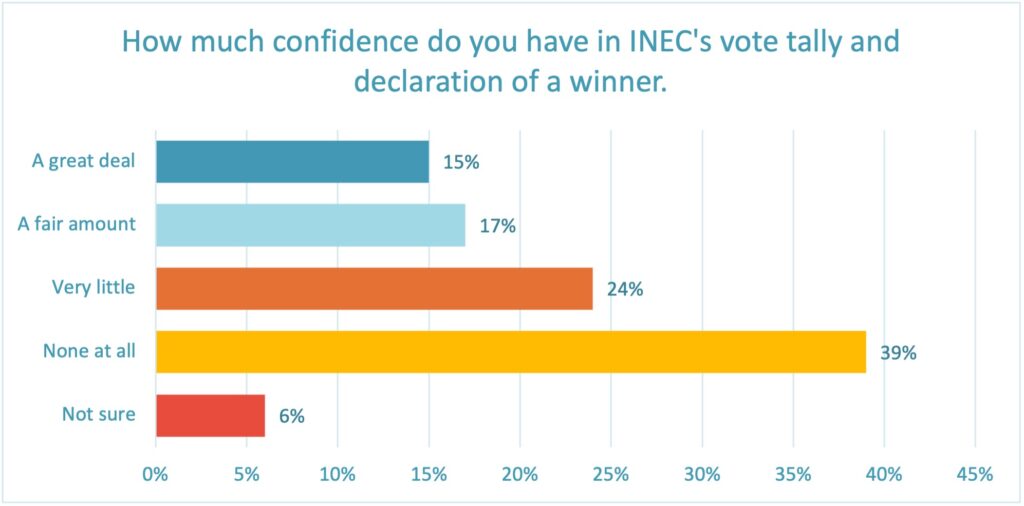
Witnessing Election Day Interference
Before INEC formerly declared Bola Tinubu the winner of the 2023 presidential election, opposition parties called for a rerun, alleging widespread vote rigging and violence. In our study, we asked voters about any personal experience with these claims.

Overall, more than 1 in 3 respondents claim they or a friend personally witnessed incidences of vote-buying (37%), voter suppression (40%), ballot tampering (36%), and violence near polling stations (39%). Similar percentages say they were only told about those incidences happening by the media. Smaller percentages say they did not see or hear about those incidences happening at all.
Perceptions of Democracy
With disruption, delays, and irregularities weakening public perception of transparency and integrity in the electoral process, it follows that most respondents say they are “very dissatisfied” with the way democracy works in Nigeria (52%).
52% are very dissatisfied with the way democracy works in Nigeria.
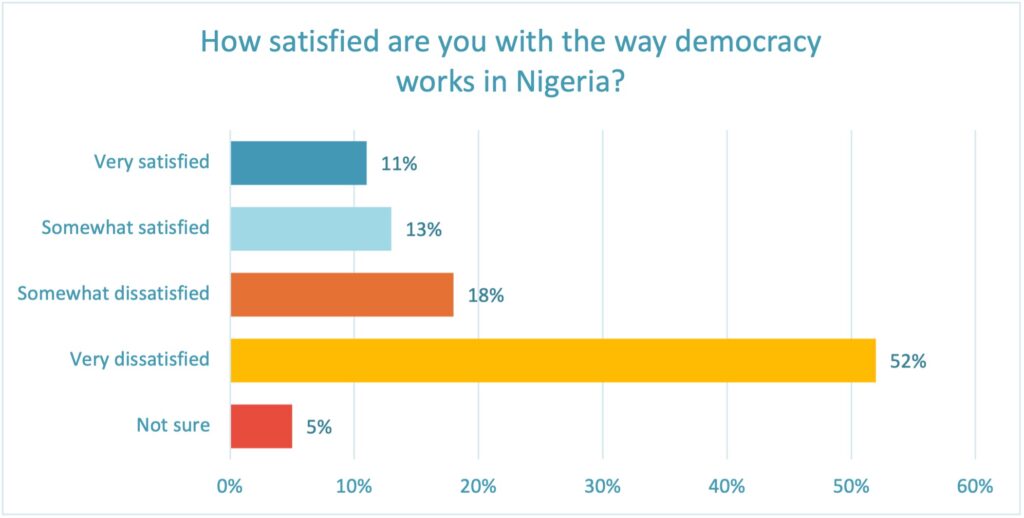
Increasing transparency throughout the electoral process will be critical for boosting public trust in the integrity of Nigeria’s democracy moving forward.
Interactive Data Dashboard
Dive deeper into GeoPoll’s data on the Nigeria elections using the interactive dashboard below. The dashboard provides responses to each question in the survey, filterable by state, age group, and gender.
Conduct Democracy and Governance Research with GeoPoll
GeoPoll’s mobile research and engagement platform allow governments and democracy groups to reach citizens in remote areas or conflict zones quickly and safely, without the need for on-the-ground enumerators. Using GeoPoll, organizations can administer surveys and educational messages to extremely specific target populations, giving them the ability to quickly assess situations and act upon the most up-to-date information.
GeoPoll conducted this survey using our proprietary SMS and mobile web research platforms. Data collection occurred from March 11-13, 2023. The multi-modal study used a simple random sampling technique from GeoPoll’s and third-party databases to achieve a diverse mix of 542 voting-age adults from across Nigeria.
For more information on the sample and methodology for this study or to conduct a research study of your own, contact us today.
Top photo by Samuel Alabi on Unsplash
